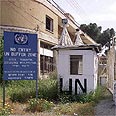
Cyprus border crossing
צילום: איי פי
Brotherhood of lepers
Many Cypriot Turks, shunned by world, openly express support for Israel
Last Friday, the Turkish Republic of Northern Cyprus marked 33 years of the Turkish invasion of the island that forcefully divided it into the Greek part (two thirds in the southern part of the island) and the Turkish part (the remaining third in the north.)
This republic is not recognized by any country worldwide, except for Turkey, and it is ostensibly cut off and isolated. While the entire world this week looked towards Turkey after the elections and the sweeping victory by Recep Tayyip Erdoğan and his party, the festivities held in Turkish Nicosia and in Kyrenia went by unnoticed.
Despite the isolation forced on the northern part, massive Turkish aid has raised the residents' standard of living to an unprecedented level – there is a massive building drive of factories, houses and hotels of all types, the cars on the roads are for the most part the latest models on the market, new businesses have opened up and the Nicosia airport has been renovated to the core.
Thirty-three years of a de facto partition have elapsed, while once in a while one side tries to unsuccessfully pull the wagon out of the mud. The last one to make such an attempt was former United Nations Secretary General Kofi Annan. However, in a referendum held on the Greek side a vast majority (some 75 percent) voted against the proposal, while on the Turkish side 75 percent voted in favor.
Annan proposed restoring the Cypriot state to its former united status, with defense, foreign affairs and judicial matters on the High Court level operating jointly for both sides, whereas the two communities would conduct their education, religion and the local authorities separately.
Annan, who was assisted by an international committee of experts, proposed another Turkish withdrawal that would minimize its presence to a quarter of the island, reducing the Turkish army by two thirds and the return of the majority of Turkish settlers who primarily came from Antalya to the mother country.
Surrounded by enemies
Cypriot Turks accuse their Greek neighbors of undermining the initiative, yet the majority of Greek Cypriots argue that acceptance of Annan's proposal would have been tantamount to recognition of the Turkish occupation and the expropriation of land that lawfully belongs to the Greek majority (some 800,000 people as opposed to 300,000 Cypriot Turks.)
Many of these elements are familiar to the Israeli visitor: The Green Line that divides the island into two parts, the UN forces patrolling the border area, the crossing near the Ledra Palace that is reminiscent of the Mandelbaum Crossing before June 1967, and particularly the deep hostility between the two sides.
Yet despite this, the two parts of Cyprus can be envied by Israelis visiting the island. Crossing between the two parts is now easier and what's more important – the conflict is not violent. The border is calm except for brief tensions. The Greek part is already a member of the European Union and the majority of the population has no wish to be annexed to its neighbors.
Many Cypriot Turks, despite being Muslim, support Israel. They declare this openly and explain it by arguing that both peoples are surrounded by enemies. This is the "No man's land brotherhood" I also found among Protestants in Northern Ireland. When I spoke of this to a friend on the Greek side, he said I was wrong; the right term is the "brotherhood of lepers."










